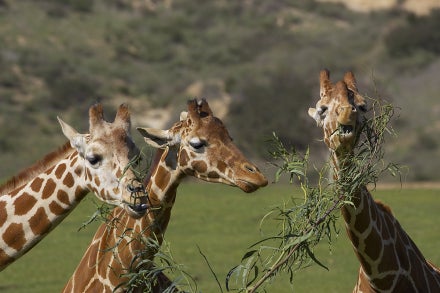Image

Zoo InternQuest is a seven-week career exploration program for San Diego County high school juniors and seniors. Students have the unique opportunity to meet professionals working for the San Diego Zoo, Safari Park, and Institute for Conservation Research, learn about their jobs, and then blog about their experience online. Follow their adventure here on the Zoo’s website!
 Disney’s Kung Fu Panda may have brought this animal to the international spotlight eight years ago, but the giant panda has been a national treasure in China for centuries. China is home to ninety percent of the world’s population of giant pandas, and reveres their national animal. However, this treasure was nearing the brink of extinction as the bamboo forests in China, providing ninety-nine percent of the giant panda’s food source, disappear due to habitat destruction. If they did not interfere, China faced a heartbreaking predicament; their national treasure might disappear altogether.
Ms. Weibel is a Senior Keeper for the Neonatal Assisted Care Unit, or the NACU for short. She told interns that she has one of the best jobs in the world because every day she gets to care for the babies in the Zoo and the NACU. Her job ranges from making milk formulas to supplementing the mother’s feeding and monitoring baby’s developmental progress. She cares for animals both in the nursery and out in their enclosures. Animals may be sent to the NACU for a variety of reasons such as maternal neglect or death, inadequate milk supply, injury, or any other medical necessities. Ms. Weibel got the unique opportunity to aid China in recuperating the giant panda population.
When a mother panda gives birth, she normally has one to two cubs. They are born blind, hairless, and weigh less than a stick of butter. The cubs are completely helpless without the care and protection of their mother. Unfortunately for the cubs, if two are born, the mother will generally abandon the weaker cub to increase the stronger one’s chance of survival. However, even after this, many cubs still don’t reach maturity due to lack of food.
To help with this problem, China’s top scientists in veterinary care began working to rescue and oversee the care for the second cubs born within a managed care setting like a Zoo. Unfortunately, this came with little to no success. Working alone, they discovered that they lacked the knowledge and proper supplies to raise the young cubs. So China finally decided to go global and seek out help from other countries.
Responding to the plea for help was Ms. Weibel and her colleagues. With backgrounds in education, biology, psychology, animal training and husbandry, Ms. Weibel and her colleagues were well versed in the needs of caring for baby giant pandas. They traveled to China and brought with them some necessary supplies, including proper formula and bottle nipples. Ms. Weibel and her colleagues trained the professionals in China on the day-to-day routines of raising baby pandas to maturity. Their work was a success! Over time, the giant panda population increased exponentially, so much so that they have officially been removed from the endangered species list.
Although Ms. Weibel and her colleagues have relieved the threat of extinction for giant pandas, there is still more work to be done. The incredible work that Ms. Weibel and her colleagues have dedicated their lives to is only one step at the long road to conservation.
Sara, Conservation Team
Week One, Fall Session 2016
Disney’s Kung Fu Panda may have brought this animal to the international spotlight eight years ago, but the giant panda has been a national treasure in China for centuries. China is home to ninety percent of the world’s population of giant pandas, and reveres their national animal. However, this treasure was nearing the brink of extinction as the bamboo forests in China, providing ninety-nine percent of the giant panda’s food source, disappear due to habitat destruction. If they did not interfere, China faced a heartbreaking predicament; their national treasure might disappear altogether.
Ms. Weibel is a Senior Keeper for the Neonatal Assisted Care Unit, or the NACU for short. She told interns that she has one of the best jobs in the world because every day she gets to care for the babies in the Zoo and the NACU. Her job ranges from making milk formulas to supplementing the mother’s feeding and monitoring baby’s developmental progress. She cares for animals both in the nursery and out in their enclosures. Animals may be sent to the NACU for a variety of reasons such as maternal neglect or death, inadequate milk supply, injury, or any other medical necessities. Ms. Weibel got the unique opportunity to aid China in recuperating the giant panda population.
When a mother panda gives birth, she normally has one to two cubs. They are born blind, hairless, and weigh less than a stick of butter. The cubs are completely helpless without the care and protection of their mother. Unfortunately for the cubs, if two are born, the mother will generally abandon the weaker cub to increase the stronger one’s chance of survival. However, even after this, many cubs still don’t reach maturity due to lack of food.
To help with this problem, China’s top scientists in veterinary care began working to rescue and oversee the care for the second cubs born within a managed care setting like a Zoo. Unfortunately, this came with little to no success. Working alone, they discovered that they lacked the knowledge and proper supplies to raise the young cubs. So China finally decided to go global and seek out help from other countries.
Responding to the plea for help was Ms. Weibel and her colleagues. With backgrounds in education, biology, psychology, animal training and husbandry, Ms. Weibel and her colleagues were well versed in the needs of caring for baby giant pandas. They traveled to China and brought with them some necessary supplies, including proper formula and bottle nipples. Ms. Weibel and her colleagues trained the professionals in China on the day-to-day routines of raising baby pandas to maturity. Their work was a success! Over time, the giant panda population increased exponentially, so much so that they have officially been removed from the endangered species list.
Although Ms. Weibel and her colleagues have relieved the threat of extinction for giant pandas, there is still more work to be done. The incredible work that Ms. Weibel and her colleagues have dedicated their lives to is only one step at the long road to conservation.
Sara, Conservation Team
Week One, Fall Session 2016
 Disney’s Kung Fu Panda may have brought this animal to the international spotlight eight years ago, but the giant panda has been a national treasure in China for centuries. China is home to ninety percent of the world’s population of giant pandas, and reveres their national animal. However, this treasure was nearing the brink of extinction as the bamboo forests in China, providing ninety-nine percent of the giant panda’s food source, disappear due to habitat destruction. If they did not interfere, China faced a heartbreaking predicament; their national treasure might disappear altogether.
Ms. Weibel is a Senior Keeper for the Neonatal Assisted Care Unit, or the NACU for short. She told interns that she has one of the best jobs in the world because every day she gets to care for the babies in the Zoo and the NACU. Her job ranges from making milk formulas to supplementing the mother’s feeding and monitoring baby’s developmental progress. She cares for animals both in the nursery and out in their enclosures. Animals may be sent to the NACU for a variety of reasons such as maternal neglect or death, inadequate milk supply, injury, or any other medical necessities. Ms. Weibel got the unique opportunity to aid China in recuperating the giant panda population.
When a mother panda gives birth, she normally has one to two cubs. They are born blind, hairless, and weigh less than a stick of butter. The cubs are completely helpless without the care and protection of their mother. Unfortunately for the cubs, if two are born, the mother will generally abandon the weaker cub to increase the stronger one’s chance of survival. However, even after this, many cubs still don’t reach maturity due to lack of food.
To help with this problem, China’s top scientists in veterinary care began working to rescue and oversee the care for the second cubs born within a managed care setting like a Zoo. Unfortunately, this came with little to no success. Working alone, they discovered that they lacked the knowledge and proper supplies to raise the young cubs. So China finally decided to go global and seek out help from other countries.
Responding to the plea for help was Ms. Weibel and her colleagues. With backgrounds in education, biology, psychology, animal training and husbandry, Ms. Weibel and her colleagues were well versed in the needs of caring for baby giant pandas. They traveled to China and brought with them some necessary supplies, including proper formula and bottle nipples. Ms. Weibel and her colleagues trained the professionals in China on the day-to-day routines of raising baby pandas to maturity. Their work was a success! Over time, the giant panda population increased exponentially, so much so that they have officially been removed from the endangered species list.
Although Ms. Weibel and her colleagues have relieved the threat of extinction for giant pandas, there is still more work to be done. The incredible work that Ms. Weibel and her colleagues have dedicated their lives to is only one step at the long road to conservation.
Sara, Conservation Team
Week One, Fall Session 2016
Disney’s Kung Fu Panda may have brought this animal to the international spotlight eight years ago, but the giant panda has been a national treasure in China for centuries. China is home to ninety percent of the world’s population of giant pandas, and reveres their national animal. However, this treasure was nearing the brink of extinction as the bamboo forests in China, providing ninety-nine percent of the giant panda’s food source, disappear due to habitat destruction. If they did not interfere, China faced a heartbreaking predicament; their national treasure might disappear altogether.
Ms. Weibel is a Senior Keeper for the Neonatal Assisted Care Unit, or the NACU for short. She told interns that she has one of the best jobs in the world because every day she gets to care for the babies in the Zoo and the NACU. Her job ranges from making milk formulas to supplementing the mother’s feeding and monitoring baby’s developmental progress. She cares for animals both in the nursery and out in their enclosures. Animals may be sent to the NACU for a variety of reasons such as maternal neglect or death, inadequate milk supply, injury, or any other medical necessities. Ms. Weibel got the unique opportunity to aid China in recuperating the giant panda population.
When a mother panda gives birth, she normally has one to two cubs. They are born blind, hairless, and weigh less than a stick of butter. The cubs are completely helpless without the care and protection of their mother. Unfortunately for the cubs, if two are born, the mother will generally abandon the weaker cub to increase the stronger one’s chance of survival. However, even after this, many cubs still don’t reach maturity due to lack of food.
To help with this problem, China’s top scientists in veterinary care began working to rescue and oversee the care for the second cubs born within a managed care setting like a Zoo. Unfortunately, this came with little to no success. Working alone, they discovered that they lacked the knowledge and proper supplies to raise the young cubs. So China finally decided to go global and seek out help from other countries.
Responding to the plea for help was Ms. Weibel and her colleagues. With backgrounds in education, biology, psychology, animal training and husbandry, Ms. Weibel and her colleagues were well versed in the needs of caring for baby giant pandas. They traveled to China and brought with them some necessary supplies, including proper formula and bottle nipples. Ms. Weibel and her colleagues trained the professionals in China on the day-to-day routines of raising baby pandas to maturity. Their work was a success! Over time, the giant panda population increased exponentially, so much so that they have officially been removed from the endangered species list.
Although Ms. Weibel and her colleagues have relieved the threat of extinction for giant pandas, there is still more work to be done. The incredible work that Ms. Weibel and her colleagues have dedicated their lives to is only one step at the long road to conservation.
Sara, Conservation Team
Week One, Fall Session 2016



